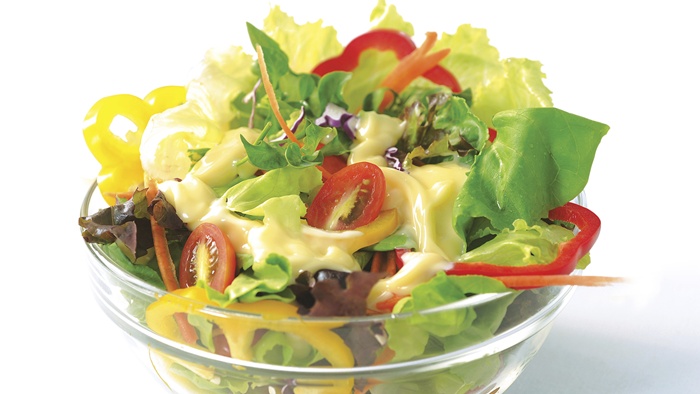
The salad is a favorite meal choice for people watching their weight and looking for healthy meal options. They’re so easy to make and can contain essentially any ingredient from chicken to eggs to olives and onions. No matter how you create one, there’s a salad out there for everybody.
But here’s a sobering thought. Although salads appear to contain simple, healthy foods, there’s a hidden ingredient which is increasing your risk of high blood pressure, kidney disease and even heart failure. The secret ingredient sabotaging your salad? Salt.
Chips, maybe, but salad? You may not associate salt with salads but new research from the United Kingdom has found that many store-bought and restaurant salads come with high amounts of salt—a potential threat to your heart.
Why Burgers Might be a Better Choice
In the U.K., pressure on food companies to lower sodium resulted in a plan to lower the population’s salt intake. The Consensus Action on Salt and Health (CASH), a private group of researchers, was founded with the goal to reduce sodium levels within the population. CASH works alongside the government and food companies to bring awareness to sodium-related health problems and create initiatives for healthy eating.
CASH surveyed 650 ready-to-eat salads from grocery stores, restaurants and fast-food venues. The findings revealed that 77% of the salads contained more salt than a bag of potato chips. Worse yet, some restaurant salads contained more salt than two-and-a-half Big Macs! Going for the big burger at lunch isn’t looking so bad anymore…
In comparison to restaurant salads, supermarket salads also contained high amounts of salt. And don’t be confused by “low-calorie” or “detox” salads; these salads also proved to be packing on the salt.
Hidden Salt Threat Does a Number on Your Heart
The American Heart Association (AHA) estimates the average American consumes 3,400 milligrams of sodium a day, more than twice the recommended 1,500 milligrams. AHA says high amounts of sodium put you at an increased risk for high blood pressure, stroke, heart failure, osteoporosis, stomach cancer, kidney stones, enlarged heart muscles and headaches. High blood pressure, in particular, has been linked to 200,000 female deaths annually, which makes it five times higher in mortality rates than breast cancer.
Making Salads Healthy Again
Following the study release, CASH offers some suggestions to still enjoy your salad, and ensure it’s not leading you down a path to poor health:
- Look out for salty ingredients, such as anchovies, cheese and capers.
- Keep your portion sizes in control. Whether it’s with the dressing or the salad itself. The nutritional information is based on a size, so if you eat the whole thing, all the numbers increase in value.
- Pay attention to your dressing. Try to stick with an oil and vinegar combination or even some lemon juice—the more natural the better. This way, you know the extra sodium added in the dressing.
On top of these tips, homemade is always best. When you make a salad yourself, you know exactly what you’re putting in and you can avoid unnecessary preservatives. But if you’re on the go and have to grab something quick, these tips will help you make an informed decision.
Go on and eat your salad! There’s no reason to ditch that flavorful mix of potentially healthy greens, veggies and protein-rich chicken and nuts. Just like most meals that come from a restaurant or fast-food place, always keep in mind the extra ingredients, fat, calories and salt that can be hiding on your plate.
So, will you be having the Caesar salad or the Greek?
Sources:
McNamee, D., “Survey of ready-to-eat salads exposes high salt content,” Medical News Today, July 30, 2014; http://www.medicalnewstoday.com/articles/280347.php.
American Heart Association, “The effects of excess sodium on your health and appearance,” American Heart Association web site, August 19, 2014; http://www.heart.org/HEARTORG/GettingHealthy/NutritionCenter/HealthyDietGoals/T.he-Effects-of-Excess-Sodium-on-Your-Health-and-Appearance_UCM_454387_Article.jsp












